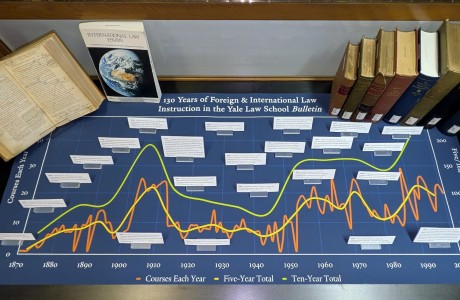The Human Rights Revolution
The Yale Law Library is welln known for its interdisciplinary holdings in economics, history, sociology, political science, and more. An important new history book has arrived on human rights, The Human Rights Revolution: An International History. This volume provides a view of the state of the field for historians such as Samuel Moyn, Professor of History at Columbia University who is visiting the Law School this semester, interested in the history of and the historiography of human rights.
This is the third title in Oxford University Press’s Reinterpreting History Series. The Series is dedicated to “the historian’s craft of challenging assumptions, examining new evidence, and placing topics of significance in historiographical context. Historiography is the art of conveying the ways in which the interpretation of history changes over time. The vigorous and systematic revision of history is at the heart of the discipline.”
After an introduction by two of the editors, the book is divided into two major parts: Part I - The Human Rights Revolution; and Part II - The Globalization of Human Rights History. This reflects the origins of the fifteen essays from two academic conferences. The first part consists of essays arising from a panel entitled “Writing the Global History of Human Rights” at the 2004 meeting of the American Historical Society in Washington, D.C. The panel was inspired by the seminal paper by Professor Kenneth Cmiel, to whom Human Rights Revolution is dedicated, that originally appeared in 109 American Historical Review 117-35 (2004) entitled, “The Recent History of Human Rights.” This paper is also the first essay in the volume.
Part II arises from a 2008 conference sponsored by the History Department of Temple University, “Human Rights as International History.” This conference was convened to mark the Sixtieth Anniversary of the Universal Declaration of Human Rights. The initial article in Part II is authored by Professor Moyn, “Imperialism, Self-Determination, and the Rise of Human Rights”, which demonstrates that self-determination and anti-colonialism were not part of the original human rights project. He further spells this out in his recent book, The Last Utopia: Human Rights in History (2010)
The subjects of the essays are wide ranging from the holocaust and the Nuremberg Trials to the international movement to end female genital mutilation and history as a human right in Japan and Korea. There are ample and useful footnotes of titles that are invaluable and perhaps not known by the legal researcher.
----- Daniel Wade

